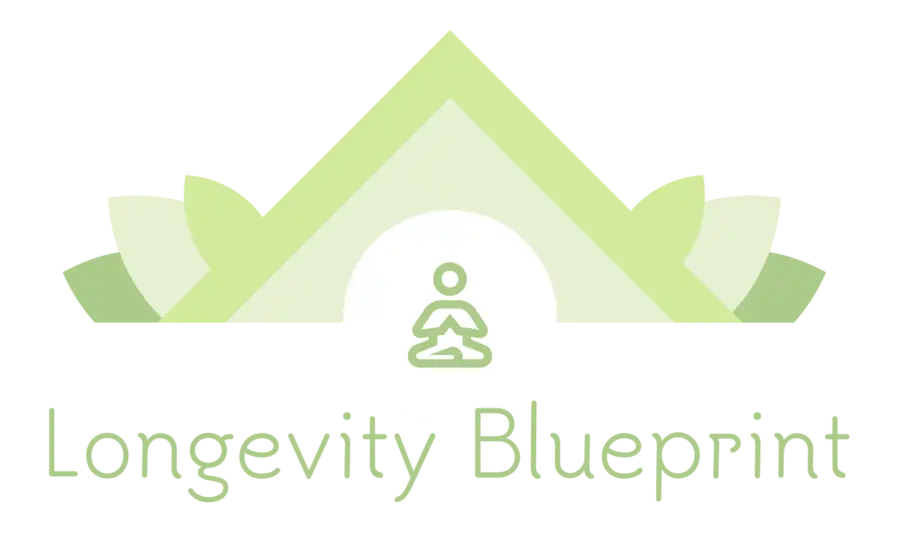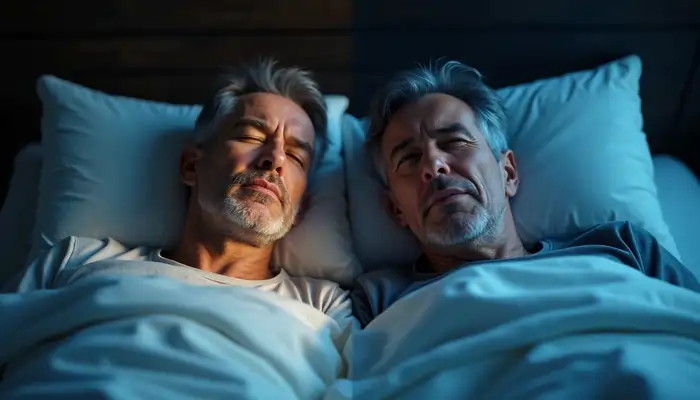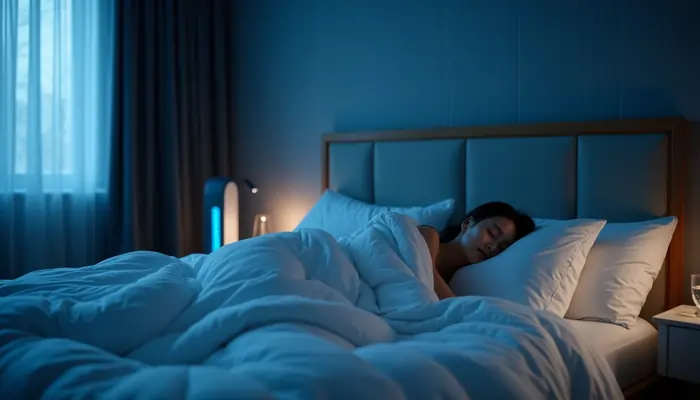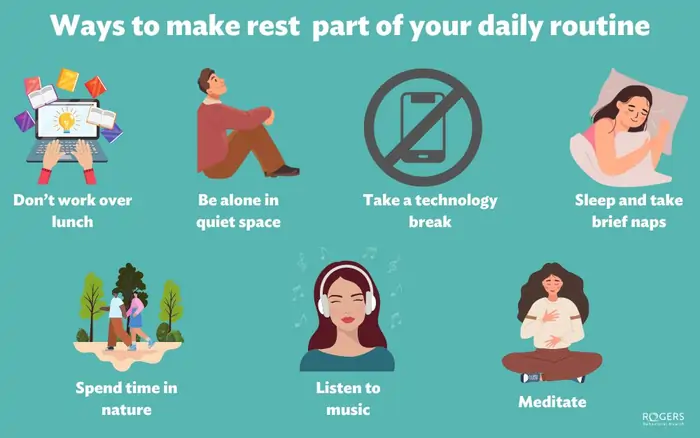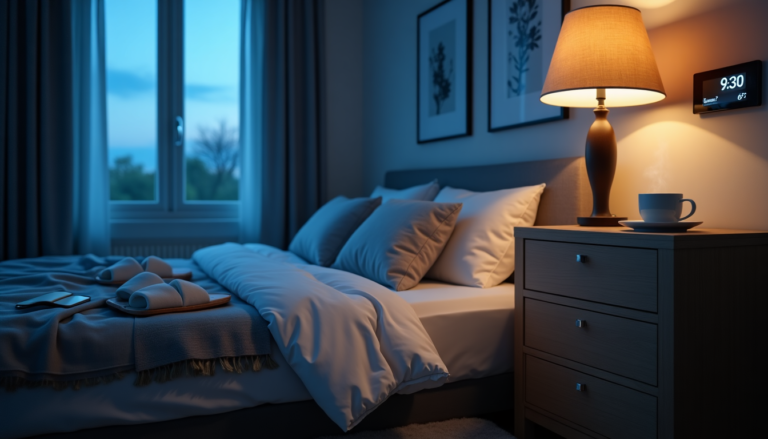15 Science-Backed Natural Sleep Aids That Actually Work

Sleep quality issues affect over 60 million Americans. Natural sleep aids are a great way to get better rest, but finding effective ones can be challenging.
Research on sleep solutions reveals troubling statistics. Sleep deprivation does more than make you tired – it raises your chances of depression, obesity, type 2 diabetes, and heart disease. Around 20% of adults now deal with insomnia symptoms regularly.
Science-backed natural sleep remedies are more available today than ever before. Two-thirds of American adults have tried melatonin supplements. Lavender-infused rooms help promote deeper sleep. My research has uncovered 15 natural sleep aids that show ground results. This piece will guide you through making smart choices for better sleep, whether you need help with occasional sleeplessness or want natural solutions for deep rest.
Melatonin: The Body’s Natural Sleep Regulator

Image Source: Sleep Foundation
Melatonin ranks among the most researched natural sleep aids. Adults in the United States have used it more frequently in the last two decades [1]. Your pineal gland produces this neurohormone when darkness falls. Scientists call it the “hormone of sleep” or “hormone of darkness” [1].
How Melatonin Works in Your Brain
The sort of thing I love about melatonin is how it promotes sleep. Your pineal gland starts releasing melatonin about 2-3 hours before bedtime [2]. This hormone doesn’t knock you out like sedatives do. It tells your body to get ready for sleep by reducing wake signals from your circadian clock [3]. The hormone also affects brain areas like the default mode network that leads to fatigue and sleep-related changes [3].
Finding the Right Melatonin Dosage
Lower doses often work better. Supplements come in strengths from 0.2mg to 20mg [4]. Most experts suggest starting with 1mg or less and slowly increasing the dose if needed [5]. Adults usually respond to doses between 1-5mg [4]. Research shows smaller amounts can be just as effective as larger ones [5]. Note that over-the-counter supplement quality varies substantially. One study revealed actual melatonin content ranged from 83% less to 478% more than labeled [6].
Timing Melatonin to Work Best
Best times to take melatonin:
- Sleep onset issues: Take 30-45 minutes before bedtime [2]
- Circadian rhythm adjustment: Take 3-4 hours before bedtime [2]
- Jet lag: Take at your destination’s bedtime [7]
Potential Side Effects to Watch For
Melatonin proves safe for short-term use, but side effects can include headaches, dizziness, daytime drowsiness, and nausea [1]. Many people report vivid dreams or nightmares [1]. Older adults might feel more daytime sleepiness because melatonin stays active longer in their system [1].
Melatonin doesn’t suit everyone. People with autoimmune disorders, depression, or those who are pregnant or breastfeeding should talk to their healthcare providers first [7].
Resources:
Magnesium: The Mineral That Relaxes Body and Mind

Image Source: MDPI
Magnesium is one of the most overlooked natural sleep aids. This mineral plays a significant role in over 300 essential processes in your body [1]. Research shows that nearly 70% of Americans don’t get enough magnesium [7], which could explain why sleep problems are so common.
The Science Behind Magnesium’s Calming Effects
Your brain’s sleep-regulating neurotransmitters need magnesium to stay balanced. The mineral boosts GABA, a neurotransmitter that calms your nervous system [2], and blocks glutamate, which causes excitement [2]. Magnesium also lowers your body’s main stress hormone, cortisol [2], which creates better conditions for sleep.
Studies show that magnesium supplements can boost your melatonin levels by a lot [8]. The mineral also helps your muscles relax, which works great for people who deal with nighttime leg cramps or restless leg syndrome [9].
Best Forms of Magnesium for Sleep
The right form of magnesium makes all the difference:
- Magnesium glycinate: Your body absorbs it easily and it binds to glycine, an amino acid that helps you sleep better [7]
- Magnesium citrate: This form absorbs well and helps with sleep issues [2]
- Magnesium L-threonate: This type reaches your brain efficiently and might improve both sleep and brain function [7]
Sleep experts suggest taking no more than 350 milligrams of magnesium supplements daily [10].
Food Sources Rich in Sleep-Promoting Magnesium
Getting magnesium from food remains the safest option [1]. These foods pack plenty of magnesium:
- Pumpkin seeds (156mg per ounce) [1]
- Spinach (78mg per half-cup cooked) [1]
- Almonds (80mg per ounce) [1]
- Dark chocolate (70-85% cocoa) (50mg per ounce) [1]
- Avocados (58mg per medium fruit) [1]
- Quinoa (118mg per cup cooked) [1]
Adding just a few of these magnesium-rich foods to your daily meals can help fix a deficiency [1] and naturally improve your sleep quality.
Resources:
- Cleveland Clinic
- Sleep Foundation
- National Institutes of Health
Valerian Root: An Ancient Herb for Modern Sleep Problems

Image Source: Amazon.com
Valerian root has served as a wealth of sedative properties since ancient Rome and Greece. Medical records show its use dates back to the first century AD. Traditional healers valued it not just as a sleep aid but also as a diuretic and menstrual stimulant.
Active Compounds in Valerian Root
Valerenic acid and valerenol create the sleep-promoting effects of valerian [8]. These substances interact with gamma-aminobutyric acid (GABA) receptors in your brain [8]. GABA serves as your body’s natural braking system that helps regulate nerve impulses throughout the nervous system. Valerian might boost GABA availability—like prescription medications such as Xanax and Valium, though much more gently [11].
How to Take Valerian Root for Better Sleep
These guidelines will help you get the best results:
- Dosage: Research supports 300-600mg of dried valerian root extract 30-60 minutes before bedtime [12][12][11]
- Forms: You can find it as capsules, tablets, tinctures, teas, and liquid extracts [8]
- Timing: The best results come after 2-4 weeks of consistent use—studies show it works better over time [13][11]
- Tea preparation: Let 1 teaspoonful (2-3g) of dried root steep in hot water for 5-10 minutes [11]
Valerian shows a gradual effect instead of immediate relief. A prominent study revealed minimal benefits in the first two weeks, but sleep improved by a lot at the four-week mark [11].
Who Should Avoid Valerian Root
Despite its widespread use, some people should be careful:
- Pregnant or nursing women [8][12]
- Children under 3 years old [8][12]
- People taking sedative medications or alcohol [12][12]
- If you have liver disease [13]
- Those with upcoming surgery (stop at least two weeks before) [11]
Most side effects stay mild—headaches, dizziness, stomach discomfort, and sometimes vivid dreams [8]. Valerian can interact with over 250 medications, including 5 major interactions [11]. You should ask your healthcare provider before starting this natural sleep remedy.
Resources:
- National Institutes of Health
- Mayo Clinic
- American Academy of Sleep Medicine
CBD Oil: Emerging Research on Cannabis Compounds

Image Source: The University of Sydney
CBD oil has become a popular sleep solution over the last several years. Research shows that people commonly use CBD to help them sleep [14]. This non-intoxicating cannabis compound shows promising evidence for various sleep disorders. These include insomnia, sleep apnea, and PTSD-related nightmares [14].
How CBD Affects the Endocannabinoid System
The endocannabinoid system (ECS) plays a vital role in regulating your sleep-wake cycle. Your brain and body contain this big network of chemical signals and cellular receptors [15]. CBD works with this system and helps your body maintain its natural balance. CBD doesn’t cause psychoactive effects like THC does. The interaction between CBD and the ECS encourages relaxation and stress management. This leads to better sleep quality [10].
Choosing High-Quality CBD Products
You need to watch for several key factors to find effective CBD products:
- Source verification: CBD from U.S.-grown hemp offers stricter agricultural regulations [16]
- Certificate of Analysis (COA): Products should have current third-party testing that confirms CBD content and shows freedom from contaminants [14]
- THC content: THC levels should stay below 0.3% to remain federally legal [16]
- Form consideration: Tinctures work faster than other forms, especially when you need help falling asleep [10]
CBD Dosage Guidelines for Sleep
Finding the right dosage takes some trial and error. Research shows that 50mg of CBD daily for 8 weeks improved sleep quality by a lot. This worked best for younger adults with no health issues [14]. Many experts suggest starting with 1-6mg for every 10 pounds of body weight [9]. A 2015 review found that daily doses between 300-600mg helped ease anxiety and promote restful sleep [9].
Potential Drug Interactions
CBD can interact with other medications in dangerous ways. Your liver’s CYP450 enzyme system processes both CBD and many prescription medications [17]. CBD might increase side effect risks when taken with:
- Blood thinners like warfarin [17]
- Heart rhythm medications like amiodaride [17]
- Certain seizure medications including clobazam [17]
- Antidepressants, benzodiazepines, and opioids [17]
You should always ask your healthcare provider before mixing CBD with any medications.
Resources:
- National Institutes of Health
- Mayo Clinic
- Sleep Foundation
Lavender: More Than Just a Pleasant Scent

Image Source: Nature
Lavender, the purple flowering herb, stands out as one of nature’s most versatile sleep aids with solid scientific backing. Research shows lavender oil contains linalyl acetate and linalool, compounds that boost both sleep quality and duration by a lot [1]. You might want to think about adding this to your nightly routine.
Aromatherapy vs. Oral Lavender Supplements
Lavender helps you sleep better in multiple ways. People who use lavender aromatherapy experience better slow-wave sleep and fewer insomnia symptoms [18]. A study revealed that participants using lavender aromatherapy stayed awake 7% less after falling asleep—that’s 90 fewer minutes of wakefulness each month [1].
Oral lavender supplements like Silexan have shown promising results in the largest longitudinal study. Clinical research supports both 80mg and 160mg doses. Many practitioners suggest starting with the lower dose, especially if you’re sensitive to supplements [19].
Setting Up Your Bedroom for Lavender Benefits
Here’s what works best when adding lavender to your sleep space:
- Add 2-3 drops of lavender oil to your diffuser during bedtime routine
- Spray lavender-infused linen mist on pillowcases and bedding
- Keep dried lavender sachets near your bed
- Use lavender-scented bath products before sleep
Lavender wall colors or accents can boost your bedroom’s relaxation factor. Design experts call it “perfect for relaxation and comfort” in bedrooms [20].
Combining Lavender with Other Sleep Aids
Lavender blends naturally among other sleep remedies. The herb pairs well with chamomile in teas or essential oil blends [1]. Research shows great results when you mix lavender with lemon balm [21]. A blend of lavender, basil, juniper, and sweet marjoram helped older patients sleep better by reducing disturbances [22].
Best results come from using lavender 30-60 minutes before bed. This gives the calming effects time to work as you get ready for sleep.
Resources:
- Sleep Foundation
- National Institutes of Health
- Journal of Alternative and Complementary Medicine
Glycine: The Amino Acid That Deepens Sleep

Image Source: Ajinomoto Group
Glycine stands out from other amino acids as an underrated but powerful natural sleep aid. This tiny molecule, the smallest amino acid, plays a crucial role in sleep regulation through several fascinating mechanisms.
Glycine’s Effect on Body Temperature and Sleep
Your sleep quality improves dramatically because glycine affects body temperature. Scientists have found that glycine helps lower core body temperature and increases blood flow to extremities. This process helps you fall and stay asleep. The temperature drop matches what naturally happens during the first two hours after you drift off.
Research shows glycine targets NMDA receptors in the suprachiasmatic nucleus (SCN), your body’s internal biological clock. Glycine triggers blood vessel expansion throughout your body this way and helps dissipate heat. The temperature-regulating effect vanishes when researchers remove the SCN in study models. This confirms the SCN’s role as glycine’s main action site.
Glycine does more than regulate temperature. It boosts your brain’s serotonin levels and works as an inhibitory neurotransmitter. These actions create perfect conditions that lead to deep, restorative sleep.
Food Sources vs. Supplements
You can find glycine naturally in several foods:
- Meat (especially tough cuts like chuck, round, and brisket)
- Dairy products (milk, yogurt, cheese)
- Bone broth
- Gelatin-containing foods
Getting enough glycine from diet alone can be tough. Your body makes about 3 grams daily, mostly in the liver, but research suggests you need around 10 grams per day. Many people use supplements to make up the difference.
Collagen supplements are a great way to get more glycine, with about 33% glycine content. Glycine powder mixes easily in liquids and tastes naturally sweet – that’s why its name comes from the Greek word for “sweet.”
Recommended Dosages Based on Research
Studies consistently show that taking 3 grams of glycine before bed helps you:
- Fall asleep faster
- Stay asleep better
- Get more deep sleep
- Feel less tired during the day
The standard 3-gram dose has proven safe in multiple studies, with no major side effects reported. New users might still see benefits from 1 gram, though not as strong as higher doses.
You’ll get the best results by taking glycine about 30 minutes before bedtime to improve sleep quality and next-day alertness.
Resources:
- Sleep Foundation
- National Institutes of Health
- Journal of Pharmacological Sciences
Chamomile: The Classic Bedtime Tea with Proven Benefits

Image Source: MedicalNewsToday
Chamomile has earned its place as one of the gentlest yet most effective natural sleep aids in traditional medicine cabinets through the centuries. Research demonstrates that elderly participants who took 200mg chamomile extract capsules twice daily for 28 consecutive days showed sleep quality improvements by a lot compared to control groups [23].
Active Compounds in Chamomile
The sleep-promoting properties of chamomile come from apigenin, a flavonoid that binds to benzodiazepine receptors in the brain and creates mild sedative effects [7]. This powerful antioxidant works like GABA, your brain’s primary inhibitory neurotransmitter. Studies show chamomile contains between 0.8% and 1.2% apigenin, though amounts vary based on product quality and brewing method [2]. Chamomile also contains many more terpenoids and flavonoids that add to its medicinal properties and gentle calming effect [7].
Preparing the Perfect Sleep-Inducing Tea
The quickest way to make sleep-inducing chamomile tea requires more than dropping in a tea bag:
- Pour boiling water over 2-3 teaspoons (2-4 grams) of dried chamomile flowers
- Cover and steep for 5-10 minutes (15 minutes yields maximum antioxidants) [2]
- You can boost it with cinnamon, lemon, ginger, or honey [24]
- Drink 30 minutes before bedtime to get the best results [25]
You can create a luxurious bedtime treat by making a honey chamomile tea latte – just combine steeped chamomile tea with warm frothed milk and a tablespoon of honey [26].
Beyond Tea: Other Effective Chamomile Formats
Chamomile works well beyond traditional tea preparations:
- Capsules/Tablets: Studies show that 200-400mg capsules taken daily boost sleep quality by a lot [27]
- Tinctures: 30-40 drops of a 1:5 45% alcoholic tincture provides similar benefits [27]
- Essential Oil: Used in diluted form for aromatherapy or topical application [28]
- Bath Additives: Adding chamomile to evening baths helps you relax
The FDA has approved chamomile as generally safe, but if you have ragweed, chrysanthemum, or other compositae family allergies, you should be careful [29].
Resources:
- Sleep Foundation
- National Institutes of Health
- FDA Botanical Safety Handbook
Passionflower: Nature’s Anxiety and Sleep Solution

Image Source: MDPI
Passionflower (Passiflora incarnata), a plant native to the southeastern United States and South America, is a chance to tackle both anxiety and sleep disorders naturally. Research shows it works in unique ways through our brain’s pathways.
Historical Use and Modern Research
The Americas’ indigenous peoples used passionflower as a natural sedative long before European explorers brought it to Western medicine in the 16th century. The plant became accessible to more people in European folk medicine as a treatment for anxiety, insomnia, and hysteria.
Clinical studies today back up these traditional uses. The plant works just as well as oxazepam (a common anti-anxiety medication) to treat generalized anxiety disorder [8]. Better yet, it has fewer side effects on how well people perform at work. A double-blind study showed that people who drank passionflower tea slept by a lot better than those who had a placebo [30].
How Passionflower Affects GABA Receptors
Passionflower’s calming effects come from how it works with gamma-aminobutyric acid (GABA), the brain’s main inhibitory neurotransmitter. Scientists think the plant boosts GABA levels in the brain, which calms certain brain cells and helps people relax [31].
The plant works in several ways:
- It stops brain cells from taking up too much GABA [8]
- It connects to both GABA-A and GABA-B receptors [32]
- It has compounds that might work as monoamine oxidase inhibitors [33]
These effects together help lower stress, improve sleep, and maybe even make memory better [8].
Finding Quality Passionflower Products
You can find passionflower in different forms:
- Tea: A cup before bed helps people sleep better [30]
- Capsules/Extracts: Studies show good results with 500mg tablets [34]
- Liquid Extracts: Tinctures are another good option
Studies show that taking 500-800mg of dried extract daily is safe for up to 8 weeks [13] if you need help with anxiety or sleep. Pregnant women should stay away from passionflower since it might cause uterine contractions [13].
Resources:
- National Center for Complementary and Integrative Health
- Sleep Foundation
- Journal of Clinical Psychopharmacology
L-Theanine: The Calming Component in Green Tea

Image Source: Nature
L-theanine, a unique amino acid found mainly in tea leaves, has become the sort of thing I love as a natural sleep aid. It helps people relax without making them drowsy. This compound creates a state of “wakeful relaxation” that naturally improves sleep quality, unlike traditional sedatives.
How L-Theanine Promotes Alpha Brain Waves
L-theanine’s relaxation benefits come from its amazing power to boost alpha brain wave activity. Research shows doses between 50-200mg improve alpha waves by a lot in the frontal region and throughout the scalp [12]. These alpha waves associate with a meditative state that brings calm alertness without tiredness [35]. The brain activity also links to lower cortisol levels, suggesting physical stress reduction [12]. L-theanine helps your brain shift into a pre-sleep state while keeping mental clarity.
Synergistic Effects with Other Sleep Aids
L-theanine works great among other natural sleep remedies:
- With GABA: Studies show this pair cuts sleep latency by 20.7% and makes sleep duration longer by 87.3% compared to GABA alone [36]
- With magnesium: Helps you fall asleep faster and sleep longer than L-theanine by itself [37]
- With melatonin: Creates matching effects since they work differently—L-theanine calms the mind while melatonin controls sleep timing [38]
This cooperative potential makes L-theanine a great foundation in a complete natural sleep strategy.
Ideal Timing for L-Theanine Consumption
Timing plays a big role to get the best sleep benefits. Evening use works best for most people who want better sleep [38]. In spite of that, L-theanine won’t make you sleepy, so daytime use helps manage stress without affecting alertness [39]. People with serious sleep problems get the best results when they take L-theanine with other sleep supplements 30-60 minutes before bed [38].
Resources:
- Sleep Foundation
- National Institutes of Health
- Journal of Pharmacological Sciences
Tart Cherry Juice: Natural Melatonin Booster

Image Source: Sleep Foundation
Tart cherry juice is a delicious way to boost your body’s natural melatonin levels and support quality sleep. The most studied variety, Montmorency cherry juice, stands out from other natural sleep remedies with its unique blend of sleep-promoting compounds.
Research on Tart Cherry’s Sleep Benefits
Studies show that tart cherry juice works well to improve sleep. Research found that adults who kept taking tart cherry juice concentrate slept by a lot longer and better [11]. The results are even more impressive in a study published in the American Journal of Therapeutics. People with insomnia who drank tart cherry juice daily slept 84 minutes longer compared to those taking a placebo [11][40].
These amazing results happen because tart cherries naturally contain melatonin and tryptophan [41]. Your sleep-wake cycle gets regulated by melatonin, while tryptophan helps your body make more melatonin [41][42]. Tart cherries also contain procyanidins that help lower kynurenine-to-tryptophan ratios, which makes tryptophan more available [11].
How Much to Drink and When
Studies suggest taking either 30ml of tart cherry concentrate or 237ml (about 8oz) of tart cherry juice twice daily to get the best results [43]. Take one serving in the morning and another 1-2 hours before bed [43][44].
Sugar-free options will give a better night’s sleep without sugar disruptions [42][41]. The juice might taste too tart for some people. You can mix it with water or blend it with other sleep-friendly drinks.
Making Tart Cherry Part of Your Nightly Routine
Adding tart cherry juice to your evening routine can be easy:
- Pure and simple: Drink it alone as a nightly “sleep signal” about an hour before bedtime
- Bedtime smoothie: Blend with banana and yogurt for a sleep-promoting nightcap
- Herbal enhancement: Add a splash to chamomile or lavender tea to work together
- Supplement alternative: Tart cherry extract capsules are a convenient option if you don’t like the taste [42]
The juice works better when paired with relaxing activities like reading or taking a warm bath [42].
Resources:
- Sleep Foundation
- National Institutes of Health
- European Journal of Nutrition
5-HTP: The Serotonin and Melatonin Precursor

Image Source: Southern Iowa Mental Health Center
5-HTP acts as a fascinating link in our body’s natural sleep chemistry and serves as the critical intermediate compound between tryptophan and serotonin. Natural sleep remedies often overlook this amino acid that plays a unique role in sleep regulation.
The Conversion Pathway from 5-HTP to Melatonin
5-Hydroxytryptophan (5-HTP) is the direct precursor to serotonin that later produces melatonin in the pineal gland. The biochemical pathway follows a clear sequence: dietary tryptophan changes to 5-HTP through tryptophan hydroxylase (TPH). Then aromatic amino acid decarboxylase (AADC) changes 5-HTP into serotonin. The process ends when serotonin becomes N-acetylserotonin and turns into melatonin through pineal-specific enzymes [45].
5-HTP’s value comes from knowing how to cross the blood-brain barrier. This allows serotonin production directly inside the pineal gland, since serotonin cannot cross this barrier by itself [46]. This mechanism helps your body’s natural melatonin production cycle.
Safety Considerations and Potential Interactions
The recommended dosage starts at 50mg daily for up to 8 weeks, which shows positive effects on sleep latency [47]. Sleep experts suggest starting with 50mg for insomnia patients. The dose can increase gradually to 100-300mg before bedtime to reduce side effects [48].
Here are the key safety concerns:
- Side effects include nausea, diarrhea, vomiting, and stomach pain [16]
- 5-HTP can interact dangerously with medications that increase serotonin levels and might cause serotonin syndrome [16]
- You should avoid certain antidepressants, cough medicines, and pain relievers [49]
- Taking 5-HTP before surgery could cause excessive serotonin that leads to heart problems, shivering, and anxiety [16]
Who Benefits Most from 5-HTP
Older adults with poor sleep quality show marked benefits from 5-HTP supplementation. Research shows significant drops in objective sleep latency after 4 and 8 weeks of 5-HTP use [47].
People with naturally lower serotonin levels might find 5-HTP helpful because serotonin production decreases with age [46]. Those who have conditions linked to serotonin deficiency, including certain types of insomnia, could see improvements with careful supplement monitoring.
Resources:
- National Center for Complementary and Integrative Health
- Sleep Foundation
- Mayo Clinic
GABA: The Brain’s Natural Sleep Signal

Image Source: Frontiers
GABA (gamma-aminobutyric acid) acts as your brain’s main calming neurotransmitter and works like a natural “off switch” for overactive neurons. People with insomnia have almost 30% lower GABA levels compared to those who sleep well [50]. This shows how crucial GABA is for quality sleep.
Understanding GABA’s Role in Sleep Architecture
Your brain uses GABA to quiet down activity and get ready for sleep. This neurotransmitter connects to specific receptors in your central nervous system and helps nerve cells slow down their activity [51]. GABA plays a key role in managing sleep stages by reducing wakefulness and helping you get more deep sleep [52]. Sleep medications like benzodiazepines target these GABA receptors to make you sleepy.
Sleep neurochemistry shows that GABA balances out stimulating neurotransmitters like glutamate. This creates the perfect environment for your brain to switch from being alert to restful [51]. Research proves that GABA blocks stress effects in your body, which helps a lot when stress keeps you awake [15].
Supplement Forms vs. GABA-Boosting Activities
Most people take GABA supplements in doses between 100-300mg about 30-60 minutes before bed [53]. A study showed that people who took 300mg of GABA fell asleep much faster after four weeks of use [51].
You can boost your GABA levels naturally through:
- Yoga practice (better than walking at increasing GABA levels) [15]
- Meditation (hour-long sessions boost GABA production) [15]
- GABA-rich foods like kimchi, sourdough, fermented foods, tomatoes, and spinach [51]
Combining GABA with Other Sleep Aids
GABA works well with other natural sleep remedies. Research shows that taking GABA with 5-HTP might improve your sleep quality and help you sleep longer than using either supplement by itself [53]. On top of that, it helps melatonin work better by reducing anxiety that might get in the way of melatonin’s sleep-promoting effects [15].
Resources:
- Sleep Foundation
- National Institutes of Health
- Cleveland Clinic
Lemon Balm: The Gentle Herb for Restless Minds

Image Source: Health
Lemon balm (Melissa officinalis), a member of the mint family, is one of the best natural sleep aids that helps calm restless minds. People have valued this sweet-smelling herb for more than 2,000 years because it helps quiet anxious thoughts and promotes better sleep [54].
Active Compounds in Lemon Balm
Several powerful bioactive compounds in lemon balm help you sleep better. Rosmarinic acid leads the pack with its anti-inflammatory and calming properties [10]. This compound works on GABA receptors in the brain—just like prescription sleep medications do, but without their unwanted side effects [10].
The herb also contains flavonoids like apigenin and luteolin that make you feel sleepy [10]. These compounds work together to help you fall asleep and stay asleep longer, which leads to more restful nights [10]. A newer study, published in Nutrients, backs these benefits up. The research shows lemon balm extract helped people sleep better and reduced their insomnia symptoms [10].
Different Forms and Their Effectiveness
You can use lemon balm in several ways to improve your sleep:
- Tea preparation: Add 1-2 teaspoons of dried lemon balm leaves to hot water and let it steep for 5-10 minutes. Drink this 30-60 minutes before bed [55].
- Standardized extracts: Research shows these extracts help reduce insomnia symptoms, especially those using Phytosome™ technology that your body absorbs better [56].
- Combination products: Lemon balm works well with other herbs like lavender, valerian, and peppermint [54]. Research shows that lemon balm combined with valerian helped people sleep much better than a placebo [57].
A double-blind, placebo-controlled study revealed something interesting. People who took lemon balm saw their Insomnia Severity Index scores drop by 2.9 points [56].
Creating a Lemon Balm Sleep Ritual
Your nightly routine becomes more effective when you add lemon balm to it. A cup of lemon balm tea 30 minutes before bedtime signals your body to relax [10]. You can boost its effects by reading a book or taking a warm bath while drinking your tea.
If you prefer something simpler, standardized supplements work well too. Take 300-500mg about 30-60 minutes before going to bed [57].
Resources:
- National Center for Complementary and Integrative Health
- Sleep Foundation
- Mayo Clinic
Ashwagandha: Ancient Adaptogen for Modern Sleep Stress

Image Source: MDPI
People have used ashwagandha in Ayurvedic medicine for thousands of years. This versatile adaptogen helps people sleep better when stress disrupts their rest. Research shows it works well to improve both sleep quality and duration [14].
How Ashwagandha Regulates Stress Hormones
Ashwagandha helps regulate the body’s stress response system. Studies show it lowers cortisol levels—the main stress hormone that can interfere with healthy sleep [9]. This ancient herb also calms down the hypothalamic-pituitary-adrenal (HPA) axis, which controls how our bodies respond to stress [58].
Clinical trials lasting 6-8 weeks showed participants who took ashwagandha felt less stressed, anxious, tired, and restless [14]. People taking 300mg twice daily slept much better [59]. The research also showed lower salivary cortisol levels in participants taking ashwagandha compared to those on placebo [59].
Finding the Right Ashwagandha Extract
Quality matters when choosing ashwagandha. Here are key factors to think about:
- Withanolides content – These active compounds create many of ashwagandha’s benefits [17]
- Form options – You can find it as capsules, gummies, liquid extracts, or powder for tea [17]
- Dosage – Research backs doses from 250-600mg daily [58], with best results at 600mg+ daily for at least 8 weeks [14]
Sleep improvements showed up best when people took standardized extracts daily for 8+ weeks, which shows why consistency matters [17].
Timing for Optimal Sleep Benefits
Evening doses often work best to improve sleep. Taking ashwagandha at night can reduce stress and anxiety while helping you wind down [17]. This lines up with your body’s natural cortisol rhythms, as levels should naturally drop in the evening [9].
Some people feel more energetic after taking ashwagandha, so evening doses might not work for everyone [60]. Morning doses might work better if you notice this effect [60].
Remember that patience matters—you’ll likely see benefits after several weeks of regular use rather than right away [58].
Resources:
- National Institutes of Health
- Sleep Foundation
- Mayo Clinic
Kava: The Pacific Island Sleep Solution

Image Source: MDPI
Kava (Piper methysticum), native to the western Pacific islands, serves as a valuable natural sleep aid today after thousands of years of ceremonial use. Studies reveal that kava extract helps people fall asleep faster and sleep better when they have sleep problems [61].
Understanding Kava’s Kavalactones
Kavalactones create sleep-promoting effects through their interaction with your brain’s GABA receptors. These compounds slow down the messages between your body and brain, similar to benzodiazepines but without the risk of dependency [62]. Research shows kava extract helps people fall asleep faster while improving their sleep quality and feeling more refreshed afterward [63]. Six major kavalactones work together to create a calming effect that helps with anxiety-related sleep problems.
Safety Considerations and Quality Control
Safety concerns about kava consumption have emerged recently. The FDA warns about its potential link to liver damage [21]. Quality control plays a vital role in safe consumption:
- Plant part matters – Root preparations offer more safety than stems or leaves [18]
- Extraction method – Water-based extractions contain liver-protective glutathione compounds and provide more safety than ethanol or acetone preparations [64]
- Dosage guidance – Research shows doses below 240mg daily work well, with 200mg improving sleep in clinical studies [63]
These factors make it essential to check with healthcare providers before taking kava, especially since it can interact with liver-processed medications [65].
Traditional vs. Modern Kava Preparations
Traditional methods involve grinding dried root into powder and mixing it with water [18]. Noble kava cultivars from Hawaii, Vanuatu, and Fiji provide the best options [64]. Modern options include capsules, tinctures, and teas. Standardized extracts help with sleep problems caused by anxiety [63].
Resources:
- National Center for Complementary and Integrative Health
- World Health Organization
- Sleep Foundation
Comparison Table
Natural Sleep Aids Comparison Table
| Sleep Aid | Main Active Compounds | Benefits | Typical Dosage | Best Time to Take | Safety Considerations |
|---|---|---|---|---|---|
| Melatonin | Melatonin (hormone) | Regulates sleep-wake cycle, helps you fall asleep | 1-5mg | 30-45 mins before bedtime | Headaches and dizziness possible; not suitable for autoimmune disorders |
| Magnesium | Magnesium mineral | Relaxes muscles, regulates GABA | Up to 350mg | Evening | Safe for most people; high doses may cause digestive problems |
| Valerian Root | Valerenic acid, valerenol | Boosts GABA, creates sedative effects | 300-600mg | 30-60 mins before bedtime | Not safe during pregnancy; interacts with sedative medications |
| CBD Oil | Cannabidiol | Reduces stress, improves sleep quality | 50-600mg | 1-2 hours before bedtime | Watch for medication interactions; verify THC content (<0.3%) |
| Lavender | Linalyl acetate, linalool | Supports deep sleep, helps with insomnia | 80-160mg (oral); 2-3 drops (aromatherapy) | 30-60 mins before bedtime | Safe for most; allergic reactions possible |
| Glycine | Amino acid glycine | Reduces core body temperature, deepens sleep | 3g | 30 mins before bedtime | Safe and natural; body produces it |
| Chamomile | Apigenin | Acts as mild sedative, reduces anxiety | 200-400mg capsules or 2-3 tsp dried flowers | 30 mins before bedtime | Avoid if you have ragweed allergies |
| L-Theanine | Amino acid L-theanine | Boosts alpha brain waves, helps relaxation | 50-200mg | Evening | Safe for daily use |
| Tart Cherry | Melatonin, tryptophan | Natural melatonin support | 30ml concentrate or 237ml juice | Morning and 1-2 hours before bed | Look for sugar-free options |
| 5-HTP | 5-hydroxytryptophan | Helps produce serotonin and melatonin | 50-300mg | Before bedtime | Avoid with antidepressants; risk of serotonin syndrome |
| GABA | Gamma-aminobutyric acid | Calms nerve cell activity | 100-300mg | 30-60 mins before bedtime | Most effective with other sleep aids |
| Lemon Balm | Rosmarinic acid | Reduces anxious thoughts | 300-500mg | 30-60 mins before bedtime | Safe but may cause drowsiness |
| Ashwagandha | Withanolides | Balances stress hormones | 250-600mg | Evening preferred | Results may take weeks |
| Kava | Kavalactones | Helps you fall asleep faster | Up to 240mg daily | Evening | FDA warns about liver damage; use carefully |
Key Resources:
- National Institutes of Health (NIH)
- Sleep Foundation
- Mayo Clinic
- National Center for Complementary and Integrative Health (NCCIH)
Conclusion
Science backs natural sleep aids as effective rest solutions. Finding the right option needs a good look at your specific needs. My research shows most people should start with mild options like chamomile tea or magnesium supplements. These choices are safe and give real benefits.
Natural sleep aids work better together than alone. A cup of tart cherry juice with magnesium glycinate works great. You could also try lavender aromatherapy with L-theanine supplements. These mutually beneficial combinations really improve sleep quality.
Your safety comes first when picking natural sleep remedies. Some substances like kava and 5-HTP might clash with medications or cause side effects. A chat with your healthcare provider before trying new sleep supplements will give a clear picture of what’s safe for you.
Good sleep doesn’t come from just one fix. It needs healthy sleep habits backed by the right natural aids. The detailed comparison table matches your sleep challenges with natural remedies. This helps you build a smart sleep strategy.
Resources:
- National Institutes of Health Sleep Research
- Sleep Foundation Evidence-Based Articles
- Mayo Clinic Sleep Medicine Center
- Cleveland Clinic Sleep Disorders Center
FAQs
What is considered the most effective natural sleep aid?
Melatonin is often regarded as one of the most effective natural sleep aids. It’s a hormone naturally produced by the body that regulates sleep-wake cycles. Supplements can help shorten the time it takes to fall asleep and improve sleep quality, especially for people with jet lag or shift work sleep disorders.
Are there scientifically proven natural remedies for better sleep?
Yes, several natural remedies have scientific backing for improving sleep. Besides melatonin, magnesium has been shown to help regulate neurotransmitters directly related to sleep. Valerian root can increase gamma-aminobutyric acid (GABA) in the brain, promoting relaxation and sleep. Lavender aromatherapy has also demonstrated effectiveness in improving sleep quality.
How can I incorporate tart cherry juice into my sleep routine?
Tart cherry juice is a natural source of melatonin and can be easily added to your bedtime routine. Try drinking 30ml of tart cherry concentrate or 237ml (about 8oz) of tart cherry juice twice daily – once in the morning and again 1-2 hours before bedtime. For best results, choose sugar-free varieties and consider blending it into a bedtime smoothie or mixing it with herbal tea.
What role does GABA play in natural sleep improvement?
GABA (gamma-aminobutyric acid) is the brain’s primary inhibitory neurotransmitter, acting as a natural “off switch” for overactive neurons. It helps decrease wakefulness and increase slow-wave sleep. While GABA supplements are available, you can also boost GABA levels naturally through regular yoga practice, meditation, or consuming GABA-rich foods like kimchi, sourdough bread, and fermented foods.
How does ashwagandha contribute to better sleep?
Ashwagandha, an ancient adaptogenic herb, helps regulate stress hormones that can interfere with sleep. It reduces cortisol levels and activity in the body’s stress response system. Studies show that taking 300mg of ashwagandha twice daily can lead to significant improvements in sleep quality. For optimal benefits, it’s typically recommended to take ashwagandha in the evening and use it consistently for at least 8 weeks.
References
[1] – https://www.mattressfirm.com/blog/lifestyle-life-moments/lavender-sleep
[2] – https://www.verywellhealth.com/does-chamomile-tea-make-you-sleepy-8602726
[3] – https://pmc.ncbi.nlm.nih.gov/articles/PMC6057895/
[4] – https://www.sleepfoundation.org/melatonin
[5] – https://www.sleepfoundation.org/melatonin/melatonin-dosage-how-much-should-you-take
[6] – https://my.clevelandclinic.org/health/articles/23411-melatonin
[7] – https://pmc.ncbi.nlm.nih.gov/articles/PMC2995283/
[8] – https://pmc.ncbi.nlm.nih.gov/articles/PMC7766837/
[9] – https://www.rochesterregional.org/hub/ashwagandha-stress-relief
[10] – https://chongmedicine.com/2023/08/28/sleep-better-naturally-harness-the-healing-properties-of-lemon-balm-and-other-herbs-for-a-good-nights-rest/
[11] – https://pmc.ncbi.nlm.nih.gov/articles/PMC5617749/
[12] – https://pubmed.ncbi.nlm.nih.gov/34562208/
[13] – https://www.nccih.nih.gov/health/passionflower
[14] – https://ods.od.nih.gov/factsheets/Ashwagandha-Consumer/
[15] – https://trymeloair.com/blogs/news/gaba-and-melatonin?srsltid=AfmBOoqtv8kCDhvSnnCyH8cfGjbPn06RORqFqocd1zGfbNqzAuQOJLb-
[16] – https://www.webmd.com/vitamins/ai/ingredientmono-794/5-htp
[17] – https://www.singlecare.com/blog/best-time-to-take-ashwagandha/
[18] – https://pmc.ncbi.nlm.nih.gov/articles/PMC7600512/
[19] – https://integrativepro.com/blogs/articles/oral-lavender-dosing-considerations
[20] – https://courtneysworld.co/home-decor/soft-lavender-bedroom/
[21] – https://www.nccih.nih.gov/health/kava
[22] – https://pmc.ncbi.nlm.nih.gov/articles/PMC3612440/
[23] – https://pubmed.ncbi.nlm.nih.gov/29154054/
[24] – https://sleepopolis.com/education/chamomile-tea-and-sleep/
[25] – https://www.sleepfoundation.org/sleep-aids/does-chamomile-tea-make-you-sleep
[26] – https://amecenter.ucsf.edu/news/pre-bed-beverage-better-sleep
[27] – https://www.va.gov/WHOLEHEALTHLIBRARY/tools/botanical-medicines-healthy-sleep-rest.asp
[28] – https://www.healthline.com/health/healthy-sleep/natural-sleep-aids
[29] – https://www.webmd.com/sleep-disorders/alternative-treatments-for-insomnia
[30] – https://pubmed.ncbi.nlm.nih.gov/21294203/
[31] – https://www.mountsinai.org/health-library/herb/passionflower
[32] – https://pubmed.ncbi.nlm.nih.gov/21089181/
[33] – https://www.mskcc.org/cancer-care/integrative-medicine/herbs/passionflower
[34] – https://www.verywellhealth.com/passionflower-everything-you-need-to-know-7510708
[35] – https://pubmed.ncbi.nlm.nih.gov/18296328/
[36] – https://pmc.ncbi.nlm.nih.gov/articles/PMC6366437/
[37] – https://www.health.com/l-theanine-and-magnesium-8639718
[38] – https://www.naturemade.com/blogs/health-articles/l-theanine-sleep
[39] – https://sleepdoctor.com/sleep-aids/l-theanine
[40] – https://us.drowsysleepco.com/blogs/drowsy-sleep-guide/truth-about-tart-cherry-juice-sleep-does-it-help?srsltid=AfmBOortYF4xOXSkxsfDqG7_–28z-iLSs09lUKR3qi6B3BJcfGvXCWQ
[41] – https://amerisleep.com/blog/tart-cherry-juice-for-sleep/
[42] – https://www.sleepfoundation.org/nutrition/tart-cherry-juice
[43] – https://examine.com/supplements/tart-cherry-juice/?srsltid=AfmBOopunL5hcJj5ZabfrWS7aHzgyzC7S7KMGDfHz5nBRNpOeLFQ4egr
[44] – https://www.texashealth.org/areyouawellbeing/Health-and-Well-Being/The-Tart-Cherry-Juice-Craze-and-Its-Impact-on-Sleep
[45] – https://www.ncbi.nlm.nih.gov/books/NBK6218/
[46] – https://www.canceractive.com/article/5htp-serotonin and melatonin
[47] – https://pmc.ncbi.nlm.nih.gov/articles/PMC8181734/
[48] – https://www.healthline.com/nutrition/5-htp-benefits
[49] – https://www.mountsinai.org/health-library/supplement/5-hydroxytryptophan-5-htp
[50] – https://www.cnet.com/health/sleep/try-this-natural-sleep-aid-instead-of-melatonin/
[51] – https://www.sleepfoundation.org/sleep-aids/gaba-for-sleep
[52] – https://journals.physiology.org/doi/full/10.1152/ajpregu.2001.281.1.R170
[53] – https://sleepdoctor.com/sleep-aids/gaba
[54] – https://www.glamor.com/story/lemon-balm-tea-benefits
[55] – https://www.gardenary.com/blog/homemade-herb-teas-for-sleep
[56] – https://pubmed.ncbi.nlm.nih.gov/39683592/
[57] – https://www.mountsinai.org/health-library/herb/lemon-balm
[58] – https://www.healthline.com/nutrition/ashwagandha
[59] – https://www.webmd.com/vitamins-and-supplements/ashwagandha
[60] – https://www.healthline.com/health/sleep/ashwagandha-for-sleep
[61] – https://pubmed.ncbi.nlm.nih.gov/15700178/
[62] – https://www.verywellhealth.com/kava-for-insomnia-relief-89337
[63] – https://pubmed.ncbi.nlm.nih.gov/14706720/
[64] – https://www.metagenicsinstitute.com/blogs/kava-enhancing-sleep-and-reducing-anxiety/
[65] – https://www.mountsinai.org/health-library/herb/kava-kava
